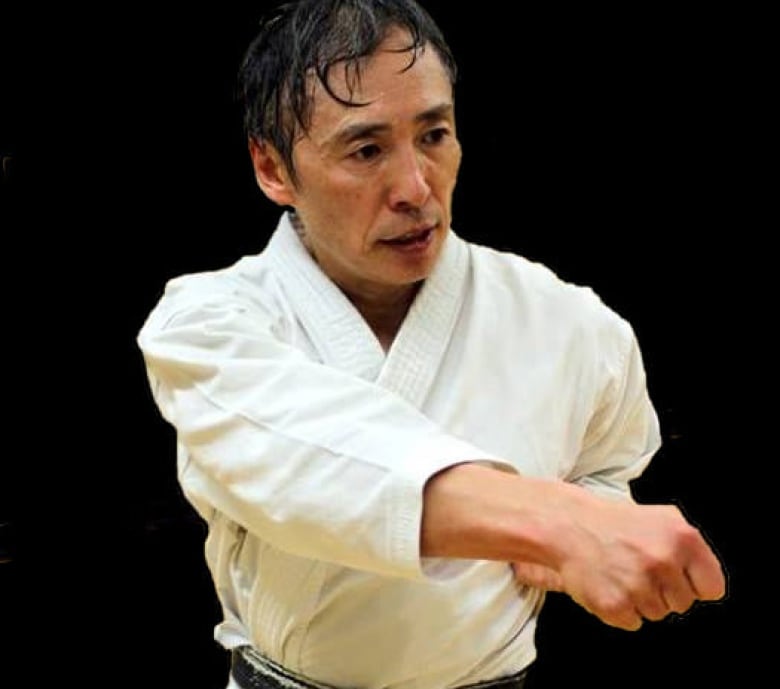Karate teaches us the obligations we have to others. COVID reinforced why that’s important
This column is an opinion of Doug Aoki, a retired academic and karate instructor. For more information on CBC’s Opinion Section, see the FAQ.
In February 2020, my spouse and I traveled to Okinawa, Japan to continue our karate training. It was our fifth trip since 2014.
COVID-19 has received increasing attention, with the First case in Canada was announced just a few weeks earlier.
When Lucy and I got back, I developed a cough and contacted the Alberta Department of Health to get tested. It was so early in the pandemic that two technicians wearing what appeared to be hazmat suits were sent to our home to do a nasal swab.
The test came back negative – but it was a sign the world had changed.

In March 2020, the province was closed all public schools. Our dojo has been in a local high school since 2011, so we lost our spot. But we adapted, first by conducting online classes and later — as we came out of the winter and it became clearer that outdoor COVID transmission had fallen sharply — by training in a park.
I was and am a karate student and teacher.
Over the next 2½ years of unfamiliar and changing times, Karate taught me how to deal with COVID.
This in turn has given me new and very old perspectives on being human.
Move on purpose
That’s what the World Karate Federation says more than 130 million people in 200 countries Doing karate and there are many different ideas about its aims and purposes.
It debuted as an Olympic event in Tokyo, but I don’t do it as a sport. My karate practice is very personal; I cannot speak for all of karate in general or my own style, Seibukan. I’m trying my best to follow Hanshi’s example Zenpo Shimabukuro. (“Hanshi” is a title given to master karate instructors.) As the world leader of Seibukan karate, he teaches purposeful movement both in the dojo and in life.
Seibukan is very traditional and steeped in Okinawan culture. It strives for precision in technique, strength and grace in the body, effectiveness in self-defense, and elevation of the spirit.
Karate values humility and has a special gift for humiliating its practitioners. It is easy to be mediocre, but extremely difficult to be good.
One thing is for sure: you can’t become the next Bruce Lee by watching a YouTube video. it takes a good teacher, years of practice, and oceans of sweat.

I’m not a COVID expert and I know social media can’t make me one. The real experts are virologists, epidemiologists and infectious disease specialists. dr Anthony Fauci deserves the same respect that I give to Shimabukuro Sensei.
At the end of each class we recite the Dojo-kun or Seibukan Oath. “Makoto no michi wo mamoru koto‘ we say in unison. Defend the Paths of Truth.
Science is a great path to truth precisely because, like a serious karateka, it looks at itself with the sternest eyes: it examines, tests and corrects itself.
Testing research in a lab—not on the internet—elevates real science above conspiracy theories and rampant misinformation. A global health crisis should only reinforce the need to keep science going when so many lives are at stake.
obligation to the community
In our Okinawa headquarters dojo hangs a beautiful Japanese calligraphy that translates to “Be hard on yourself, be gentle on others.” This is the Seibukan ethos.
Especially in the pandemic, the imperative should be clear: do what is necessary to take care of others, even if it is difficult. Commitment to community trumps individualistic rhetoric of freedom.
In concrete terms, this means following scientifically determined public health recommendations.

In the dojo we require up-to-date vaccinations. We screen participants before each class. Whenever possible, we hold classes outside. And we distance ourselves.
Now that we can resume indoor training, we are making N95 masks mandatory. We use two electronic air purifiers. We maximize ventilation and monitor CO2 levels never exceeding 550ppm. We track local COVID indicators like hospitalizations and sewage signals that show COVID is still here and still active.
To win you have to face reality
WHO’s Maria Van Kerkhove recently spoke about pandemic fatigue, about how many people just want the pandemic to be over.
In a street fight, you and others could be killed if you believe what you want to believe to be true instead of facing reality.
Same goes for COVID.

Karate is structured through discipline, doing what is necessary for as long as necessary.
Hanshi Shimabukuro has been training almost every day for 70 years; I’ve been trying to do the same thing for almost 18 years. He says, “Finding an easy, comfortable way to do things is not the way of karate, and it’s not my way.”
Real karate requires a lot more effort than wearing a mask.
For me it is unthinkable to get tired of what needs to be done after only 2½ years. In karate, as in life, we only get better as we remain true to our responsibility to something bigger than ourselves. Karate teaches how to fight, but that really means how to fight for a better world.
Do you have a compelling personal story that can inspire understanding or help others? We want to hear from you. Here is More information on how to contact us.